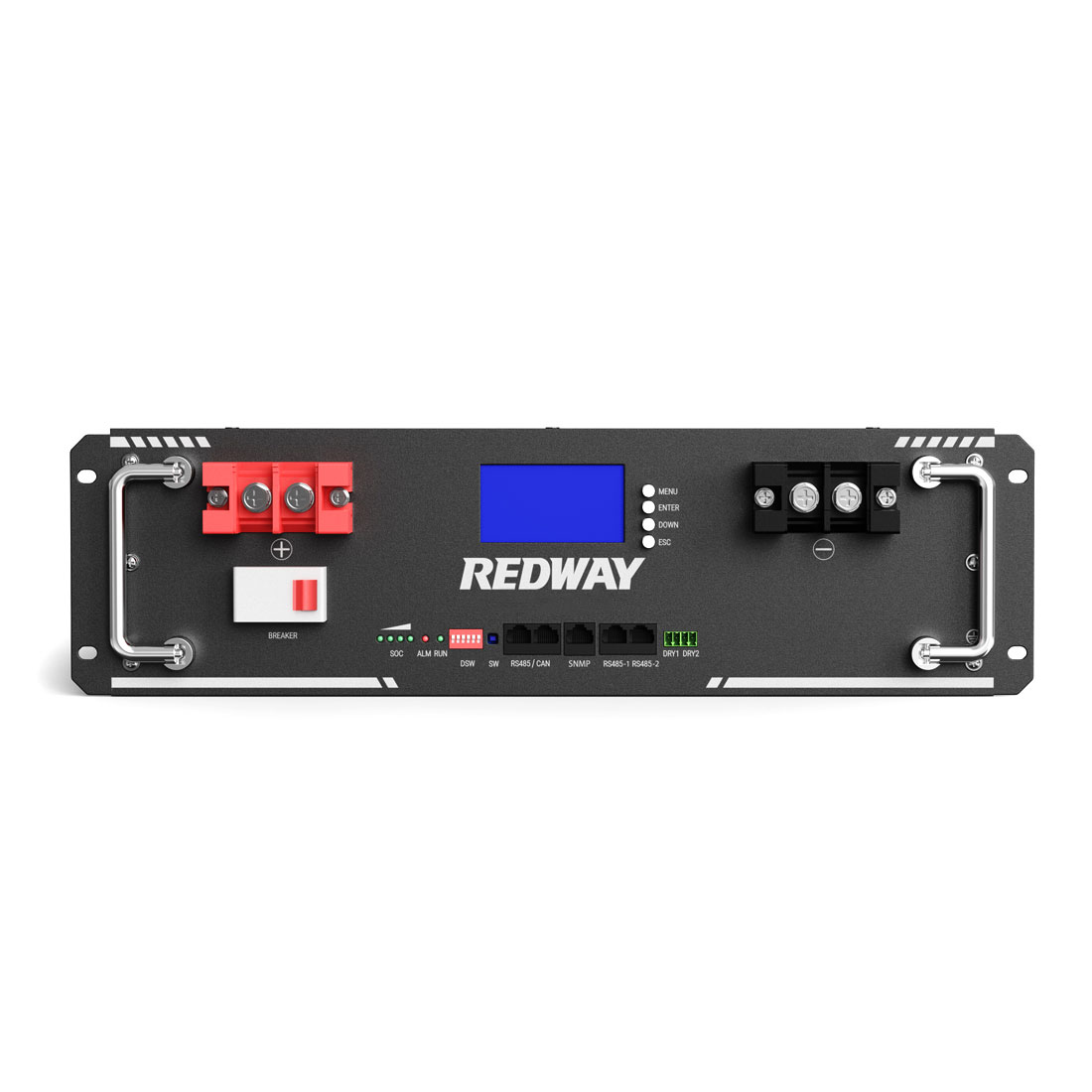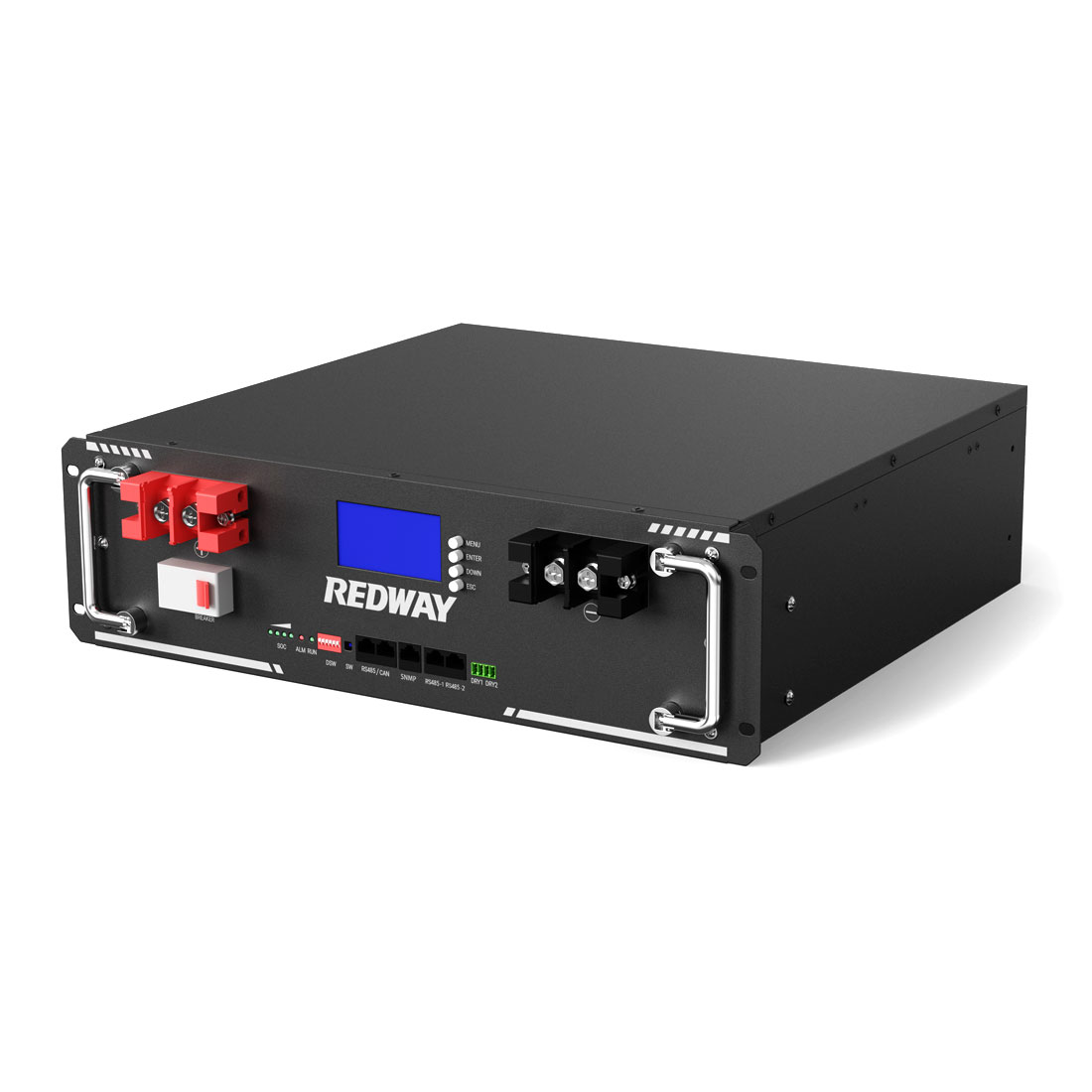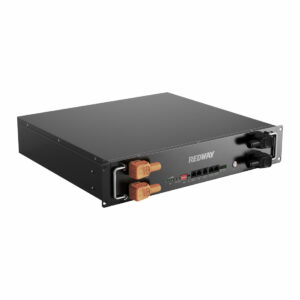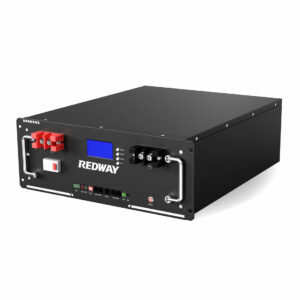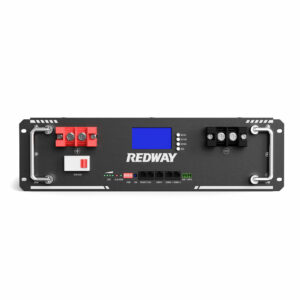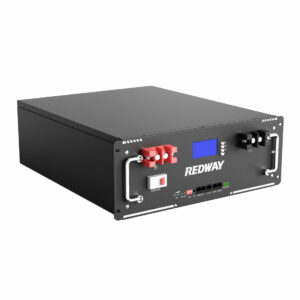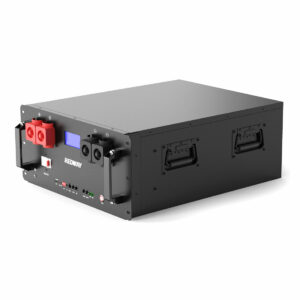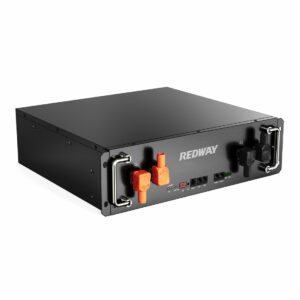Description
The 51.2V 100Ah Lithium Battery (RG51100P) is a premium energy storage solution tailored for OEMs, ODMs, and wholesale buyers in industrial and renewable energy sectors. With 5.12 kWh capacity, this battery excels in Telecom Base Stations, C&I ESS, Data Centers, and solar systems, delivering unmatched reliability and efficiency for critical power needs.
Key Features
High Energy Density: A 51.2V system with 100Ah capacity provides 5.12 kWh of energy, ideal for high-demand applications.
Robust LiFePO4 Technology: Built with stable LiFePO4 cells and IP21-rated housing for indoor durability and safety.
Ultra-Long Cycle Life: 8000 cycles at 80% DOD ensure decades of service, reducing total ownership costs.
Rapid Charging Support: Handles up to 100A charge/discharge current for quick energy replenishment.
Customizable Integration: Optional upgrades like Bluetooth, self-heating, CAN-bus, and fire suppression adapt to diverse OEM requirements.
Product Description
The 51.2V 100Ah Lithium Battery (RG51100P) combines compact design (440x440x136mm, 40kg) with industrial-grade performance. Utilizing LiFePO4 chemistry and JBD BMS, it safeguards against overcharge, deep discharge, and extreme temperatures. Certified to UL1973, IEC62619, CE, and UN38.3 standards, this battery meets global safety protocols for Telecom, Data Centers, and hybrid solar systems.
Compatible with major inverters like Victron, Deye, and Growatt, it offers seamless integration into existing setups. Optional cabinets, 4G/WiFi connectivity, and thermal fire suppression enhance versatility for OEMs. As a trusted lithium battery manufacturer, we ensure 20+ year design life and full OEM customization, empowering businesses to deliver cutting-edge energy solutions worldwide.
Ideal for hospitals, schools, and off-grid solar systems, the 51.2V 100Ah Lithium Battery is engineered for scalability (up to 16 parallel units) and global export compliance. Backed by certifications and a focus on OEM flexibility, it redefines reliability in energy storage.
What Are the Benefits of the 51.2V 100Ah Telecom Rack Lithium Battery by RackBattery?
The 51.2V 100Ah Telecom Rack Lithium Battery by RackBattery is a high-capacity, reliable energy storage solution designed for telecom, data centers, and industrial applications. Featuring advanced LiFePO4 chemistry, smart SNMP-enabled BMS, and a compact 3U rack design, it offers long cycle life, scalable capacity, and enhanced safety for critical power needs.
How Does the 51.2V 100Ah Telecom Rack Lithium Battery Operate?
This battery utilizes lithium iron phosphate (LiFePO4) cells, delivering a nominal voltage of 51.2V and a capacity of 100Ah, equating to 5.12 kWh of usable energy. Its integrated smart Battery Management System (BMS) supports SNMP and RS485 communication protocols, enabling real-time monitoring and remote management. The 3U rack form factor fits standard telecom racks, providing seamless integration into existing infrastructure while ensuring efficient thermal management and power delivery.
What Are the Key Specifications of the PM-LV51100-TELECOM-3U Battery?
| Specification | Details |
|---|---|
| Cell Chemistry | LiFePO4 (Lithium Iron Phosphate) |
| Nominal Voltage | 51.2V |
| Capacity | 100Ah |
| Energy Capacity | 5.12 kWh |
| Dimensions (L x W x H) | 440 x 440 x 136 mm (3U rack) |
| Weight | 40 kg |
| Max Charge Voltage | 58.4V |
| Discharge Cut-off Voltage | 40V |
| Max Continuous Charge/Discharge Current | 100A |
| Cycle Life | Over 8000 cycles (@80% DOD) |
| Max Parallel Connections | 16 (customizable up to 32) |
| IP Rating | IP21 (Indoor use) |
| Terminal Type | M6 Threaded |
| BMS Communication | SNMP, RS485 |
Which Industries Can Benefit Most from This Telecom Rack Battery?
This battery is engineered for:
-
Telecommunications: Providing reliable backup power for base stations and network equipment.
-
Data Centers: Ensuring uninterrupted power for critical IT infrastructure.
-
Commercial & Industrial ESS: Supporting energy storage systems in factories and commercial buildings.
-
Renewable Energy Systems: Storing solar or wind power for off-grid or hybrid applications.
How Does RackBattery Ensure the Quality and Safety of Its Telecom Batteries?
RackBattery adheres to strict manufacturing standards including ISO 9001:2015 and UL certifications (UL1642, UL1973). Each battery undergoes comprehensive testing for electrical, mechanical, and thermal performance. The smart BMS provides multiple layers of protection against overcharge, over-discharge, overcurrent, short circuit, and temperature extremes, ensuring safe operation in demanding environments.
What Customization and OEM Services Does RackBattery Provide?
RackBattery offers flexible OEM and ODM services, allowing clients to customize battery capacity, voltage, communication protocols, and enclosure design. This adaptability ensures the battery fits specific telecom infrastructure and operational requirements, including customized SNMP integration for network management systems.
How Does the SNMP Feature Enhance Battery Management?
Simple Network Management Protocol (SNMP) allows the battery to communicate detailed status information such as voltage, current, temperature, and health metrics to network monitoring systems. This enables proactive maintenance, fault detection, and remote troubleshooting, minimizing downtime and optimizing battery performance.
What Are the Advantages of LiFePO4 Chemistry in Telecom Rack Batteries?
LiFePO4 batteries offer superior thermal stability, longer cycle life, and enhanced safety compared to traditional lead-acid or other lithium-ion chemistries. They maintain consistent performance over thousands of cycles, have lower self-discharge rates, and are environmentally friendly, making them ideal for critical telecom applications.
How Can Users Scale Their Energy Storage with This Battery?
The PM-LV51100-TELECOM-3U supports parallel connections of up to 16 units (expandable to 32), allowing users to scale capacity from 5.12 kWh to over 160 kWh. This modular design facilitates flexible power solutions that grow with operational demands.
What Are the Environmental Benefits of Using Rack-mounted Lithium Batteries?
Rack-mounted lithium batteries reduce carbon footprint by enabling efficient renewable energy storage and minimizing reliance on fossil fuels. Their long lifespan and recyclability further contribute to sustainable energy practices.
How Is Thermal Management Achieved in This Telecom Rack Battery?
Thermal management combines passive heat dissipation through metal casing and active cooling via rack ventilation. The BMS continuously monitors temperature to prevent overheating and triggers protective measures if limits are exceeded, ensuring stable operation.
RackBattery Expert Views
“The 51.2V 100Ah Telecom Rack Lithium Battery from RackBattery represents a pinnacle in telecom energy storage solutions. Its integration of LiFePO4 chemistry with SNMP-enabled smart BMS offers telecom operators unparalleled reliability, safety, and scalability. RackBattery’s rigorous quality controls and customizable OEM services ensure this battery meets the diverse and evolving needs of global telecom infrastructure.”


